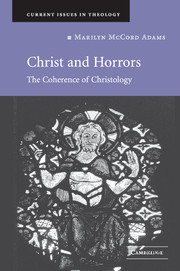Book contents
- Frontmatter
- Contents
- Preface
- 1 Christology as natural theology: methodological issues
- 2 Posing the problems: beginning with Job
- 3 Sharing the horrors: Christ as horror-defeater
- 4 Psychologizing the person: Christ as God-man, psychologically construed
- 5 Recovering the metaphysics: Christ as God-man, metaphysically construed
- 6 Learning the meanings: Christ in the hearts of all people
- 7 Cosmic coherence and the primacy of Christ: Christ, the One in Whom all things hold together
- 8 Resurrection and renewal: Christ the first fruits
- 9 Horrors and holocausts, sacrifices and priests: Christ as priest and victim
- 10 Christ in the sacrament of the altar: Christ in the meantime
- Bibliography
- Index
10 - Christ in the sacrament of the altar: Christ in the meantime
Published online by Cambridge University Press: 03 December 2009
- Frontmatter
- Contents
- Preface
- 1 Christology as natural theology: methodological issues
- 2 Posing the problems: beginning with Job
- 3 Sharing the horrors: Christ as horror-defeater
- 4 Psychologizing the person: Christ as God-man, psychologically construed
- 5 Recovering the metaphysics: Christ as God-man, metaphysically construed
- 6 Learning the meanings: Christ in the hearts of all people
- 7 Cosmic coherence and the primacy of Christ: Christ, the One in Whom all things hold together
- 8 Resurrection and renewal: Christ the first fruits
- 9 Horrors and holocausts, sacrifices and priests: Christ as priest and victim
- 10 Christ in the sacrament of the altar: Christ in the meantime
- Bibliography
- Index
Summary
Interim exercises
Futuristic eschatology promises that, in the life to come, the plot will resolve for everyone: all shall be well, all shall be well, all shall be very well! But what about in the meantime? Horrors, the attendant alienation from self, God, and others, are a heavy cross to bear.
Christianity advertises a God Who wants to help us in the meantime. Traditionally, sacraments are means of grace, liturgical rites through which participants appropriate ante-mortem benefits of the Savior's work. Like birth, baptism is once and for all and acknowledges our adoption as God's children. By contrast, the second sacrament – the Lord's supper, holy eucharist, the sacrament of the altar, the sacrifice of the mass – is oft-repeatable, a rite to which we regularly return throughout our lives, and so a scene of Divine–human relationship development. For horror-participants who have not given up on God altogether, for the wrestling and congregating Church, the second sacrament is particularly promising because it puts horrors front and center. By Christ's own command, its explicit purpose is “to show forth the Lord's death until He comes”: “do this in remembrance of me!” My suggestion is that this makes the second sacrament an apt place for horror-participants to begin to “learn the meanings”: to enter into an ever deeper recognition of how Stage-I horror-defeat is accomplished through Christ's Incarnation and passion, and thereby to take some steps towards Stage-II horror-defeat.
- Type
- Chapter
- Information
- Christ and HorrorsThe Coherence of Christology, pp. 282 - 313Publisher: Cambridge University PressPrint publication year: 2006



